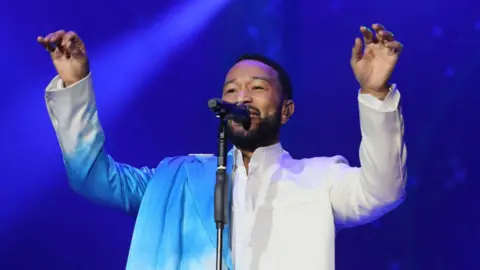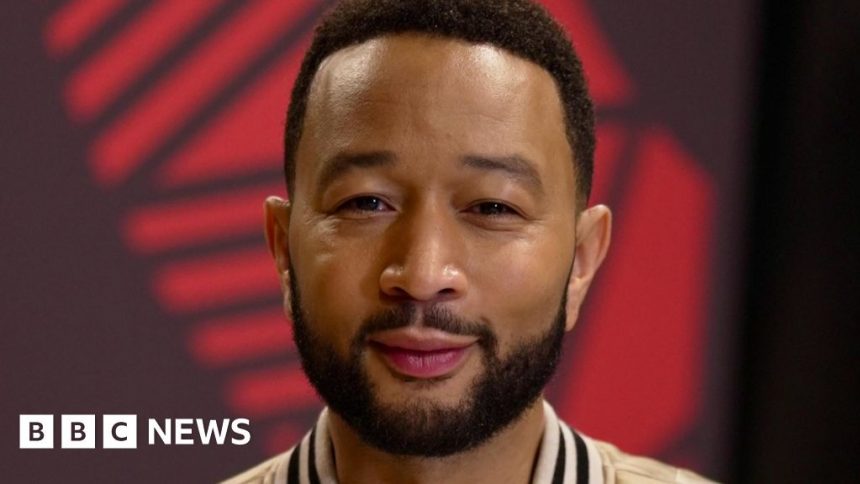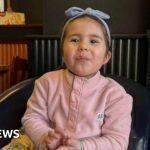US star John Legend defends playing Rwanda concert during war
 Getty Images
Getty ImagesAmerican singer-songwriter John Legend has told the BBC he is unfazed by a public backlash against his decision to perform in Rwanda, despite the country’s involvement in the war in its neighbour the Democratic Republic of Congo.
“I don’t believe that we should punish the people of Rwanda and punish the people of other countries when we disagree with their leaders,” he said after last week’s concert in Kigali.
In recent weeks, M23 rebels, backed by Rwanda, have seized the two largest cities in the mineral-rich east of the DR Congo.
Hundreds of thousands of civilians are now destitute having fled their homes, and shocking violence, including the rape of children, has skyrocketed.
Critics argue that Legend could have made a powerful statement by pulling out of the concert, especially given his highly respected “EGOT” status as someone who has won the Emmy, Grammy, Oscar and Tony awards.
Fellow Grammy-winner Tems did pull out of last week’s concert in Rwanda, saying she would “never, ever intend to be insensitive to real-world issues”.
But Legend defended his decision to headline the Move Afrika event in Kigali, which was run by the Global Citizen NGO and attracted thousands of fans from across the continent.
He said he was not being paid for the performance but felt it was his duty to help “grow touring capabilities” on the African continent, which is often overlooked by international stars on so-called world tours.
“I’m aware of what’s happening [in DR Congo] and I’m aware of the calls there have been for me to not do this show, but I really believe that the mission of Move Afrika is still important,” he told the BBC.
Delighted fans at the sold-out show agreed, but the social media backlash was ferocious enough to force Legend to delete an Instagram post he had made promoting the event.
Belgium-based activist Denise Zanesa had argued that “performing under the banner” of Rwanda “would be akin to collaborating with oppression itself”, in a message posted to X (formerly Twitter).
It was a sentiment echoed by others, including Simone Umba in the US, who wrote in a TikTok video caption: “So are we ready to talk about Rwanda’s use of Black American culture in their soft campaigning to normalise their terrorising of eastern Congo?”
Taking a political stance would have been nothing new for the star.
Legend is outspoken in his criticism of US President Donald Trump. He also severed ties with former mentor Kanye West when he ran for president, suspecting it was part of a wider Trump campaign to “siphon” black people’s votes away from the Democrats.
The debate over Rwanda’s relationship with popular global figures is also not new.
Most recently, Rwanda has been accused of “sportswashing” – with critics saying it uses the feel-good factor of international football to cover up alleged human rights abuses at home.
The East African nation is said to receive $1bn (£800m) a year in foreign aid and its tourism arm – Visit Rwanda – has lucrative sponsorship deals with Arsenal in England, Bayern Munich in Germany and Paris St-Germain in France.
When asked his thoughts on the topic, Legend’s aide told the BBC that he would not answer that question.
It appears that, as far as Legend and his team are concerned, his music itself should do the talking.
You may also be interested in:
 Getty Images/BBC
Getty Images/BBCGo to BBCAfrica.com for more news from the African continent.
Follow us on Twitter @BBCAfrica, on Facebook at BBC Africa or on Instagram at bbcafrica







